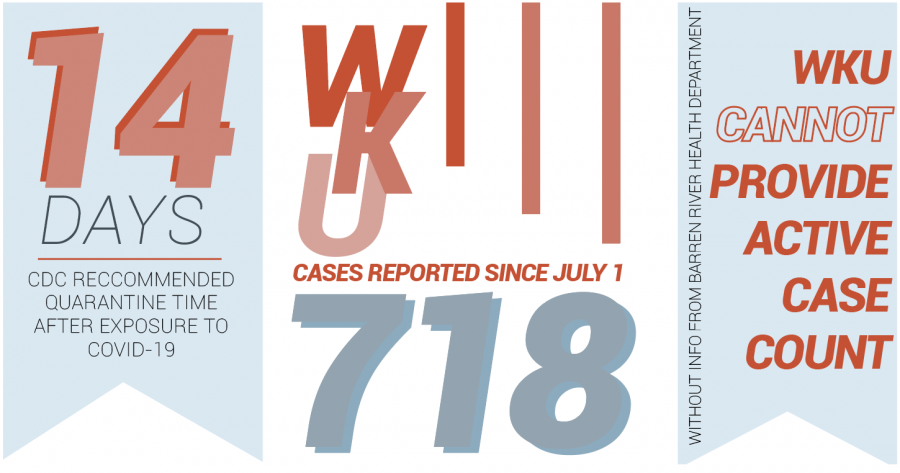Need to Know: The facts about WKU’s response to COVID-19
October 13, 2020
When Executive Director for Housing and Dining Mike Reagle set out to prepare the campus for WKU’s fall semester, he knew there would be a learning curve for administration to overcome.
“When you’re starting from scratch, there’s lots of mistakes that you’re gonna make,” Reagle said. “We got a lot of folks on this end that worked 24/7 for months at getting all this together and are trying to create an environment for [students].”
Reagle and WKU’s administration want- ed to provide a space for students to stay in order to avoid spreading COVID-19 to their families or hometowns.
Centers for Disease Control and Prevention Guidelines state that anyone who has been in contact with an individual who has tested positive for COVID-19 must quarantine for 14 days after their interaction, regardless of their own test result.
As of Monday, 19 students are currently quarantined in Barnes Campbell Hall. Between Aug. 16 and Oct. 12, 205 students have been through on-campus isolation.
In total, WKU has reported 718 coronavirus cases since July 1, and 662 of those were students. The cases are only counted through self-reporting and positive tests conducted from Med Center Health and WKU’s Graves Gilbert Clinic.
Data from the Barren River Health Department is not included due to an update in the department’s contact tracing system. Without information from BRHD, WKU cannot provide an active case count.
Before the semester began, WKU designated 334 quarantine beds in three on-campus locations: the cottages in the International Village, a wing of Bates Runner Hall and Barnes.
Barnes was originally designated as “overflow” housing. Students with a private bathroom were initially allowed to remain in their rooms as long as they had a similar test result as their roommate.
Administration realized this system posed problems in food delivery. Some students experienced late deliveries and cold meals.
“We were making about five stops [three times a day] in a golf cart and delivering all these meals up to a student’s room,” Reagle said. “You can understand why meals were colder at that point and you can also understand how it’s not sustainable.”
Reagle said it was more efficient to relocate all quarantined students to a central location.
Today, when students are designated to quarantine, Barnes is the default location, leaving the others for students with “significant health considerations,” who needed to be near professional staff, said Bob Skipper, director of media relations.
Barnes, built in 1966 and renovated in 2003, was originally scheduled to be demolished this summer to make room for construction of the Freshman Village.
The Herald spoke to seven students who quarantined in Barnes between Sept. 9 and the present, some of whom reported issues during their stay.
Reagle said the building’s water system fluctuated between water being too hot and too cold before maintenance was able to correct it.
Reagle said some students would leave to get food or supplies, possibly spreading the disease in the process.
“We have found students that have left the building and we have dealt with it through the conduct process,” Reagle said.
Reagle said an area was set aside for food deliveries for residents in quarantine as a way both to keep them in the building and provide some comfort.
Students have also experienced intrusive sounds from the adjacent Freshman Village construction site.
“We’ve got to continue to carry on with the construction projects that are there, and we try to do it being as user-friendly as we can since students are living in that building,” Reagle said.
“There are also other buildings around that site, they’re also having that.” Reagle said construction crews have been asked not to begin work until after 8 a.m. but some noise may still occur before as crews arrive at the site.
David Oliver, director of environmental health & safety at WKU, said the university was advised on how to develop a safe quarantine space with help from the Barren River Health Department and information from the CDC. “[Barren River Health Department has] a specialized unit for communicable diseases that we work with daily,” Oliver said. “If we have a situation that is sort of unusual, we get the data, we will call them and have them provide us guidance on those cases. We don’t get, we don’t make judgment calls with this, this is strictly public health.”
Oliver said that the communication between Barren River Health Department and the university has helped to guide administration in outfitting employees with appropriate personal protective equipment.
“If somebody is highly symptomatic or if we had a medical emergency then we would also use a disposable gown and a face shield and we have those available,” Oliver said. “We’ve outfitted WKU police with both the N95, KN95 respirators and face shields for their officers who may have to assist medical patients.”
Reagle said no official decisions have been made for quarantine housing for winter break or the following semester.
Lily Burris contributed with reporting
Michael J. Collins can be reached at [email protected]. Follow him on Twitter at @MJCollinsNews.
Laurel Deppen can be reached at [email protected]. Follow her on Twitter at @laurel_deppen.















